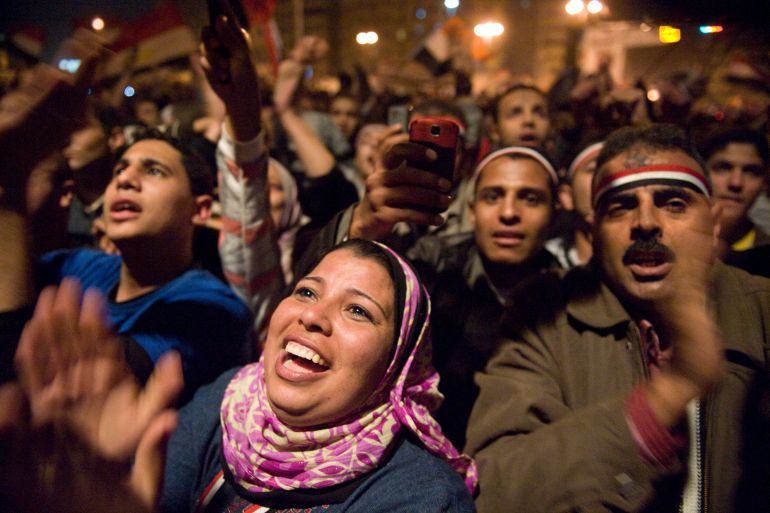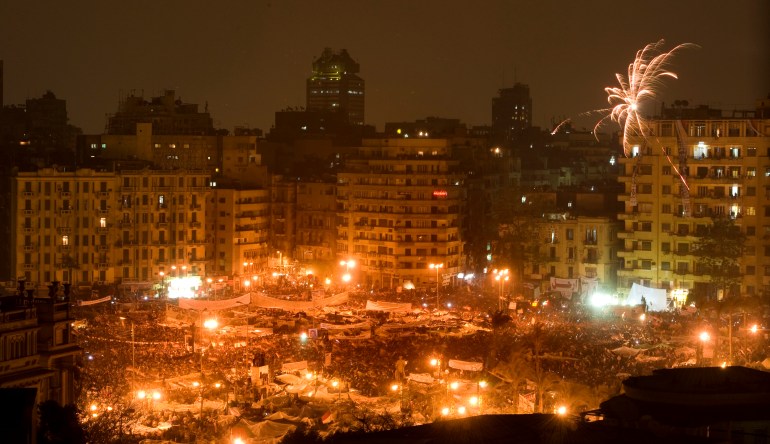‘It was a dream’: Remembering the fall of Egypt’s Hosni Mubarak
Ten years after Egypt’s President Mubarak stepped down, a protester remembers a night of hope and celebrations in Cairo.

On February 11, 2011, after 18 days of protests demanding an end to President Hosni Mubarak’s 30-year rule, elation filled the streets of Egypt.
Then-Vice President Omar Suleiman announced Mubarak’s resignation on state television, saying: “In the difficult circumstances our country is facing, President Muhammad Hosni Mubarak has decided to give up the office of the president of the republic.”
Keep reading
list of 4 itemsRemembering Tahrir Square, 10 years on
Egypt 2011: ‘We did not know we would be documenting history’
Interactive: The Arab Spring RetweetedThis article will be opened in a new browser window
Cheers erupted from crowds gathered in Cairo’s Tahrir Square, the centre of the protests. Egyptians had gathered in almost every major town and city since January 25 to demand “bread, freedom and social justice”, many facing water cannon, armoured trucks and tear gas to make their voices heard.
Here, 43-year-old sales consultant Amr Mostafa* remembers the day.
I can feel the goosebumps just remembering the square. The feverish excitement that filled the air, the tension that clung to the vibrating air, exactly like in the lead up to a football match, as we waited with bated breath to hear the news.
“We did it. We did it.” As the words of the army general and then vice president Omar Suleiman rang out, there was a deafening roar in the crowd, with people falling to their knees and others hugging each other with tears in their eyes. Elderly men were crying. It was a dream – a dream that we could finally have a voice, and that we could be treated as human beings.
In any other country, if you find yourself in a car accident, there’s a process. There’s a way to claim your rights, to have due process and be compensated. That was never the case in Egypt. It was about who you knew, the connections you had and the ability to bribe. The most powerful ruled and the laws were not applied to them.
So when the revolution was unfolding in front of our eyes, whether on the streets or at home behind the TV screens, we weren’t thinking of lofty dreams or creating history. We were remembering small incidents of injustice, like when your wallet was stolen and there was nothing you could do about it. Or when you were insulted and humiliated in the street, and had to take it quietly because the person in front of you had the power and connections. These were the small details crossing our minds and making us cry. Will I finally be able to get my rights? Can my son actually secure a place in a good university, despite my lack of connections? It was like a reel of a lifetime’s worth of injustices played out in front of our eyes, and suddenly a silent hope bubbled through, allowing us to finally dare to believe we could find something better.
The past 18 days had been unlike anything we’d ever lived through before, and the world inside Tahrir Square was unlike anything we had witnessed before. It was a utopia, where all the societal rules that had become the norm in Egypt seemed to no longer apply. In those 18 days, it was like people had returned to their innate goodness, fiercely loving and protecting each other. Christians would form a protective shield around Muslims so they could pray, girls could walk alone late at night, and everyone shared the same koshari plate, taking a spoon each. There was one aim, one dream shared by all, regardless of class, age or political leanings. People were reluctant to leave the square even to shower and freshen up. Nobody wanted to leave that world.
When the news came [about the resignation], people lifted each other, hugged each other and rejoiced, but they cried as they left.

We walked so much that night. From the presidential palace, to Tahrir Square, we looked at every street and alley with fresh eyes. It was like all of Egypt had descended on the streets and we’d materialised our dream. Some voices said, “Don’t leave the square,” but nobody listened. We were drunk with the euphoria, believing in our strength and giddy with the excitement of possibility.
I remember walking endlessly, feeling like I was documenting a moment in time, capturing the glimmer of hope that was throbbing across the city. Even the air smelled different that night and the following day. I kept taking deep breaths, marvelling at the instantaneous change.
Everywhere you looked, people were laughing and smiling at each other. With the happiness came a sense of ownership of this country. We went down the next day to pick up the rubbish, clearing up the streets after the late-night celebration. Before, if you threw something in the street, you’d shrug it off and say this entire country was a dumpster. But on the high of Mubarak leaving, if anyone dared throw something, we’d admonish them and pick it up – this is our country. We took such pride that the country was finally “ours” and everything was rose-tinted. The possibilities seemed endless.
It was like we were born on January 25, and that’s why we cannot leave that memory behind. We pass by Tahrir Square now and look away, unable to raise our heads. We went from the peak of happiness and hope to the depths of despair and darkness. It’s like our lives stopped at that moment in time. We lost something so precious that it was impossible to move on. “January 25” is not a date or event – it’s a feeling, a state of being.
Years in the making
What people don’t realise is that January 25 was not a one-off – it was years in the making. The revolution was an event we’d been preparing for a long time.
We’re a hundred million in Egypt and split into many groups, political thoughts, sects and beliefs – but for years, the one thing in common between our different walks of life were the injustices faced. That unifying thread ran through the different groups of Egyptian society, and that made January 25 possible.
It’s wrong to view Egypt as politically stagnant and stationary, or that the planned protests on January 25 came out of a vacuum. People had tried to protest before, to organise demonstrations or labour movements.
But January 25 was pivotal in that everyone held their breath, waiting to see if something would come from it – if this would be the time that people succeed.
Before, we knew there was corruption, torture and injustice. We whispered it among each other but it was underground. Khaled Saeed [a 28-year-old man beaten to death by police] changed all that. When the news started circling about Khaled Saeed online, as more and more evidence started appearing, filmed, photographed and shared online, people couldn’t push it under the rug any more.

Perhaps the greatest irony is that it was the very youth raised and trained by Mubarak, as part of different initiatives like the AFS Intercultural Programs, or like the ones overseen by Suzanne Mubarak [President Mubarak’s wife] and the regime as a whole, that eased the way for a revolution. Youth in international interchange programmes saw how different countries had developed. Everyone understood there were problems, that there were no freedoms, but people could not articulate it. Now you had a generation of well-travelled, well-read youth, with technology at their fingertips, who were suddenly able to put into words what people had spent their lives feeling. They had a framework to reference, debate – and dream.
It was obvious that something was changing in the Egyptian psyche. The meaning of protests had changed as people moved away from shouting riots. The style of protests changed. Protesters would dress in black, form a human chain quietly, and stand apart in silence in a prominent place. Security forces did not understand how to deal with these new forms of dissent. Disturbing the peace? They were standing quietly, without a word. Of course, it would be attention-grabbing, but what could police accuse them of? We saw five-minute flash protests, where people would come together within seconds, only to melt away within minutes. By the time security forces arrived, no one would be there. Even the idea of a sit-in was novel.
These preparations all took place ahead of the revolution. It was like a dress rehearsal, checking the terrain.
Sooner or later, people will resist again. There’s only so much people can bear. Mubarak, for all his oppression and corruption, gave the masses breadcrumbs in the hope of abating their ire. Today, Egypt is living through unprecedented crackdowns on freedoms, and such a bitingly harsh economic crisis that simply existing is unaffordable. I don’t know when, but there’s no way a people who dared to dream once will leave their dream to die.
*Name changed to protect the protester’s identity.
This interview has been edited for clarity and length.
